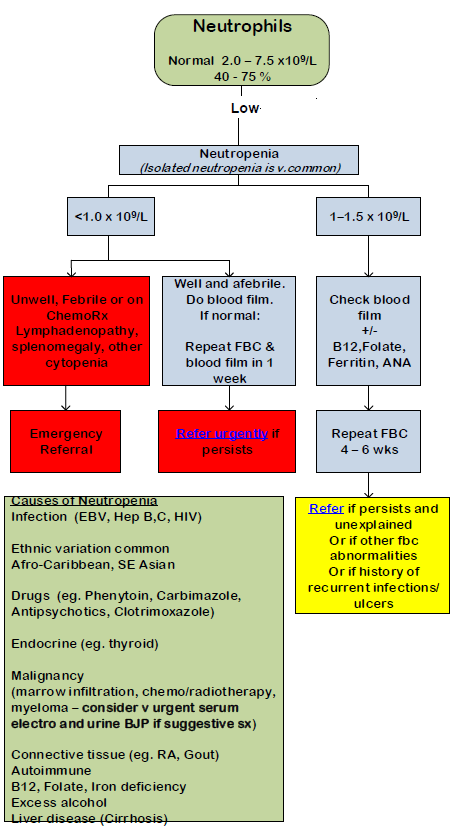Neutropaenia
- neutropenic sepsis is a potentially fatal complication of anticancer treatment (particularly chemotherapy)
- mortality rates ranging between 2% and 21% have been reported in adults. Aggressive use of inpatient intravenous antibiotic therapy has reduced morbidity and mortality rates and intensive care management is now needed in fewer than 5% of cases in England. Systemic therapies to treat cancer can suppress the ability of bone marrow to respond to infection. This is particularly the case with systemic chemotherapy, although radiotherapy can also cause such suppression.
- mortality rates ranging between 2% and 21% have been reported in adults. Aggressive use of inpatient intravenous antibiotic therapy has reduced morbidity and mortality rates and intensive care management is now needed in fewer than 5% of cases in England. Systemic therapies to treat cancer can suppress the ability of bone marrow to respond to infection. This is particularly the case with systemic chemotherapy, although radiotherapy can also cause such suppression.
Neutropaenia:
- normal adult peripheral blood absolute neutrophil count is 2.0-7.5 x 10^9/l - this is influenced by physical activity, age, genetic factors
- neutropaenia is an absolute neutrophil count less than 1.5 x 10^9/l (1)
- agranulocytosis implies a complete absence of neutrophils in the peripheral blood - however, in practice, the term is used to describe neutropaenia that is particularly severe (< 0.3 x 10^9/l)
A neutrophils count of less than 1.5 x 10^9/l may be due to:
- decreased production
- normal production but increased consumption
Presentation is usually with recurrent and prolonged infections which:
- frequently involve the skin and mucous membranes
- commonly are staphylococcal
- may show minimal clinical features despite severe infection
- are complicated by suppurative lymphadenopathy
A neutrophil count of <0.5 x 10^9/l requires immediate medical/haematological review. Asymptomatic patients require prophylactic antibiotic treatment (e.g. ciprofloxacin) because of risk of infection
When to refer patients in the community for suspected neutropenic sepsis
- suspect neutropenic sepsis in patients having anticancer treatment who become unwell
- refer patients with suspected neutropenic sepsis immediately for assessment in secondary or tertiary care
Starting antibiotic therapy (1)
- beta lactam monotherapy with piperacillin with tazobactam as initial empiric antibiotic therapy should be offered to patients with suspected neutropenic sepsis who need intravenous treatment unless there are patient-specific or local microbiological contraindications
- an aminoglycoside should not be offered, either as monotherapy or in dual therapy, for the initial empiric treatment of suspected neutropenic sepsis unless there are patient-specific or local microbiological indications
A suggested management of a low neutrophil count in an adult is presented (3):

Reference:
- NICE (September 2012). Neutropenic sepsis: prevention and management of neutropenic sepsis in cancer patients
- Prescribers' Journal 1999; 39 (3): 144-53.
- NHS Camden CCG. Abnormal FBC guidance - for adults (Accessed 30/10/19)
Related pages
Create an account to add page annotations
Add information to this page that would be handy to have on hand during a consultation, such as a web address or phone number. This information will always be displayed when you visit this page